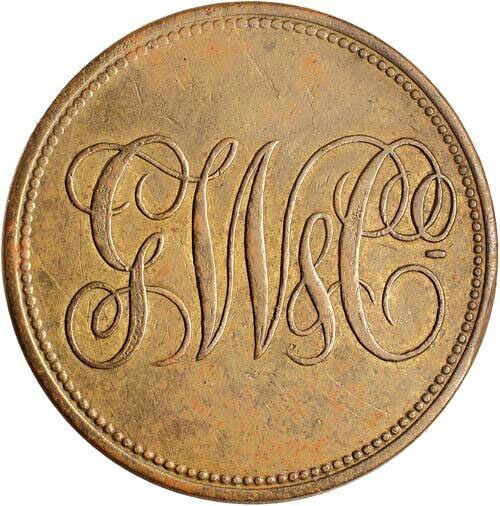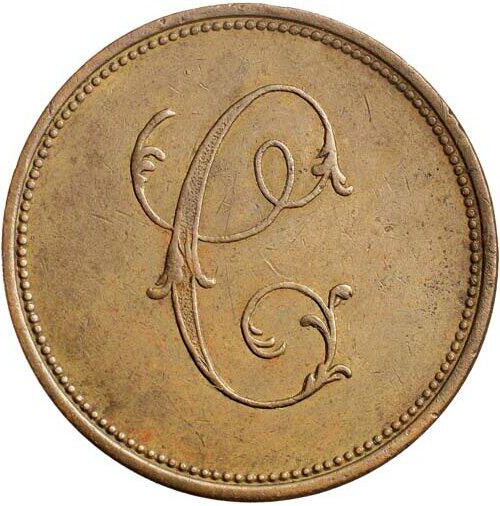| SPECIFICATIONS | |
| Denomination | pence |
| Alloy | Brass |
| Diameter | 28 mm |
| Thickness | mm |
| Weight | 7.90 gms |
| Shape | round |
| Edge | Plain |
| DieAxis | O° |
| Issue | |


|

|

| ||||||||||||||||||||
| Lowsley Unlisted; Pridmore #107 | ||||||||||||||||||||||
| Obverse : Monogram | GW&CO | (George Wall & Co) | within a beaded circle inside raised rim. |
| Reverse : Monogram | C | (Cotanchina Mills) | within a beaded circle inside raised rim. |
See also the similer M token, and the Half Value tokens associated with the name of George Wall.
The tokens represented a value of 4½d which
were revalued to 12½ cents after decimal coinage was issued.
4½D converts to 18¾ cents at the legal 50 cents
per shilling rate adopted in 1870.
WALL, George & Co. These tokens are associated with the name of George Wall who was perhaps the greatest of all Englishmen in Ceylon public life. His name is still perpetuated in the street name Wall Street, Kotahena, and by a fountain in Cinnamon Gardens, Colombo. He was born in Lancashire in 1820 and arrived in Ceylon in 1846 under the auspices of the Ceylon Plantation Company of which he took up the acting managership on his arrival in Ceylon in 1846. The office of the company was in Kandy and George Wall took up his residence at Haramby (or Aramba) House which was subsequently occupied by the Kandy Club in the nineties and is now the Hotel Suisse. Wall was manager of the company until he went to Colombo in 1850 to open his own business. A man of great physical strength he is said to have felled in the forests alongside the best axemen of the day. He was the visiting agent to several up country coffee estates. Wall was the first Englishman to occupy the chair of the Planters' Association of Ceylon, a position he occupied on ten occasions until 1884. He sat in the Legislative Council of Ceylon and ventilated the grievances and claims of the colony. He led an agitation for reform of the legislature and assisted in the home agitation against the Ceylon Paddy Tax. He was an astronomer and a botanist. At one time he was reputed to possess the best collection of ferns.
In 1850 George Wall opened public offices in Colombo and in 1853 he took in two partners. By 1863 the business had grown into an important concern with no fewer than twelve European assistants in the office.
The continued spread of leaf disease in the coffee plantations and the difficulty of recovering cash advances seriously affected the firm and in August, 1879, they suspended payment. Simultaneously with the suspension, a new firm was founded in order to retain some part of the old business. This new firm operated under the name of Courthope Bosanquet & Co.
Reference
* The Coins of British Commonwealth of Nations to the end of the
reign of George VI 1952
Part 2 - Asian Territories by F. Pridmore Spink & Son Ltd., 1965.
Tokens
The XF grade token was scanned at 600 dpi and the images are displayed at 250 dpi. It was purchased in 2009 August from a dealer in Lanka.